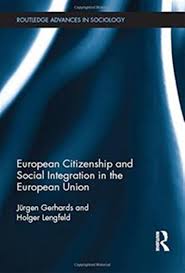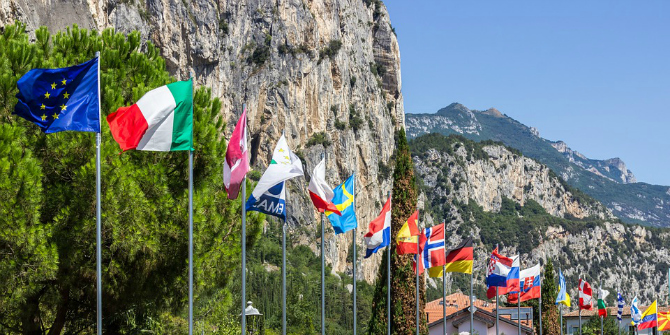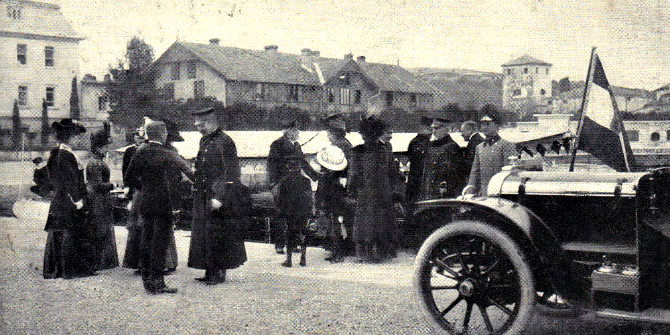In European Citizenship and Social Integration in the European Union, Jürgen Gerhards and Holger Lengfeld pose the question of whether it is plausible to refer to ‘European society’ through an examination of social integration in Germany, Spain and Poland as well as in Turkey. While questioning the specific choice of countries included in the study as well as the limitations of using survey data drawn from 2009, Pier Domenico Tortola positions this book as a valuable benchmark for future developments and research in the field.
European Citizenship and Social Integration in the European Union. Jürgen Gerhards and Holger Lengfeld. Routledge. 2015.
 Searching for European Society
Searching for European Society
The social side of European integration has gained prominence recently as a result of the euro crisis. For one thing, the crisis has affected European societies deeply, both materially and ideationally, by reviving Euroscepticism. For another, Europe’s predicament highlights the need for further social integration—and a proper European demos—as a prerequisite for the transformations that, many argue, the Union needs to fix its institutional imbalances and avert future crises.
It is therefore not surprising to see a recent rise of interest in European integration on the part of sociology, a trend of which the volume examined here is a prominent example. In it, German scholars Jürgen Gerhards and Holger Lengfeld tackle perhaps the single most fundamental question in the sociology of European integration: is there a European society?
While the authors’ goal is empirical, operationalising an idea as fuzzy as European society entails several conceptual questions, which are confronted in the beginning of the book. Society, the authors contend, should be defined in terms of collective identity. While in nation-states identity was based on language, religion and ethnicity, in the EU it can only be interpreted in civic terms. Building on the work of Thomas Marshall, Gerhards and Lengfeld posit such civic identity as founded on the triad of civil/economic, political and social rights afforded by EU citizenship. Concretely, Europe is socially integrated if: a) a majority of citizens accepts the equal distribution of the three rights throughout the Union; b) opposing minorities do not constitute socio-economic or cultural groups that could be easily mobilised; and c) EU citizens respect the three rights in their day-to-day behaviour.
As a test of integration, Gerhards and Lengfeld then present the results of a 2009 survey conducted in three EU member states—Germany, Spain and Poland—plus Turkey. To each country’s 1,000 respondents the authors asked questions on their acceptance of citizenship rights irrespective of nationality (the three right types were exemplified by the right of foreigners to, respectively, work in any EU country, vote and be voted for in local elections and receive welfare services in their host country), quasi-behavioural questions on the application of EU rights and finally background/opinion questions for correlational purposes.
To summarise the results, citizens in the three EU countries display a generally high degree of support across the three rights, both in principle and in their daily interactions. (The only exceptions concern a lower than expected level of support for foreigners’ social rights among Germans, and some scepticism across all three countries on the granting of passive electoral rights to foreigners). Turkey, conversely, scores low on all dimensions of integration, thus displaying low cohesion with the remaining three countries. On the political mobilisation side, finally, while the authors find some correlation between such variables as the respondents’ education and political preferences and their position vis-à-vis EU rights, the effect of such variables is not as big as to pose a political problem for the Union.
 Image Credit: meineresterampe
Image Credit: meineresterampe
Based on the foregoing, the authors draw optimistic conclusions on social integration in the EU (though not in its neighbourhood), and the prospects for further political integration. To be truly successful, however, the latter should follow three criteria aimed at reinforcing its legitimacy in the eyes of EU citizens: first, cross-border labour mobility should be matched by rules to prevent wage dumping; second, (passive) political rights should be coupled with norms against clientelism; and finally, the extension of social rights to foreigners should be structured so as to prevent welfare tourism and other abuses.
Gerhards and Lengfeld have produced an interesting volume, which presents an engaging conceptual discussion of European citizenship and rights, and provides valuable evidence on the topic. Their questions are a welcome addition to the more traditional and generic survey strategies aimed at detecting European identity, and so is their attempt to draw connections between the social and policy spheres of European integration.
The authors’ choice to use data on people’s support of the three right types as an indicator of social integration is a debatable yet legitimate research strategy. Discussing the authors’ choice in this respect would open a conceptual Pandora’s box which goes beyond the scope of this review. Here we should rather comment on the volume on its own terms, so to speak, presenting in the remainder of this review four critical remarks on the methods and substance of the book.
One of the merits of Gerhards and Lengfeld’s research is to take the question of identity seriously, by subjecting it to the test of ‘practicing what one preaches’ in day-to-day interactions with foreigners. Exactly because of that, however, one cannot but wonder whether the authors are not asking too much of the survey tool, whose ability to record actual behavioural patterns is partial at best. Granted, the paucity of data on intra-EU social discrimination probably left the authors with few viable options other than their hypothetical survey questions. Even so, the absence of references to external data when this does exist is notable, more so when such data could have enriched the rather static picture provided by the volume—as, for instance, in the case of the latest report on employment discrimination by the EU Agency for Fundamental Rights (2011).
Equally odd is the author’s inclusion of Turkey in the study, given that their integration indicators are derived directly from the Union’s legal architecture. Leaving aside the normative undertones of the oft-repeated statement that Turkish citizens exclude themselves from the European project, one should question how meaningful that statement is if the prerequisite to take up the EU’s civic identity is to be part of the project in the first place. Given its conceptual setup, the study would have probably gained by replacing Turkey with a fourth EU member. The United Kingdom clearly comes to mind as a possible substitute, whose inclusion would have given us salient attitudinal information on all three dimensions of citizenship rights.
Looking at the UK would also have forced the authors to tackle the question of Euroscepticism more thoroughly. While the authors’ attention to the mobilisation potential of ‘unsocialized’ minorities is commendable, by linking political activation to background socio-economic and cultural cleavages they put forward a derivative interpretation of Euroscepticism, which underestimates the latter’s ability to structure political conflict autonomously. This is inconsistent with the EU’s historical dynamics and more importantly with current European politics, a central feature of which is the rise of nationalist and populist movements.
The above points to a broader problem with the volume, namely that it does not fully examine the effects of the crisis on Europe’s social integration and its (potential) political repercussions. This results from using survey data from 2009, a time at which the crisis had yet to produce its greatest effects on the continent’s economies and societies. The lack of fresher data should invite some caution in judging the volume’s optimistic conclusions, which rest on what is at best incomplete information.
Would more up-to-date empirics have brought Gerhards and Lengfeld to a different assessment of the EU’s prospects? Not necessarily: the analysis of the societal effects of the euro crisis promises to be more complex than one might assume at first. While some ‘disaggregative’ effects of the crisis are evident, some observers have begun to ask whether the turmoil of recent years might not also generate integrative effects among European peoples (Vobruba 2012; Eder 2014). While often just sketched, such arguments do indicate an interesting research agenda for the sociology of European integration. By not saying much on these issues, Gerhards and Lengfeld’s volume truly feels, in this sense, like a missed opportunity. Looked at from a different angle, however, the book’s arguments and data will represent a precious benchmark for further developments in this research agenda in future years.
Pier Domenico Tortola is the director of EuVisions, an observatory and data collection project on social Europe affiliated with the University of Milan and the Centro Einaudi of Turin, Italy.
![]() A longer version of this review was originally posted on EuVisions.
A longer version of this review was originally posted on EuVisions.
Note: This review gives the views of the author, and not the position of the LSE Review of Books blog, or of the London School of Economics.







